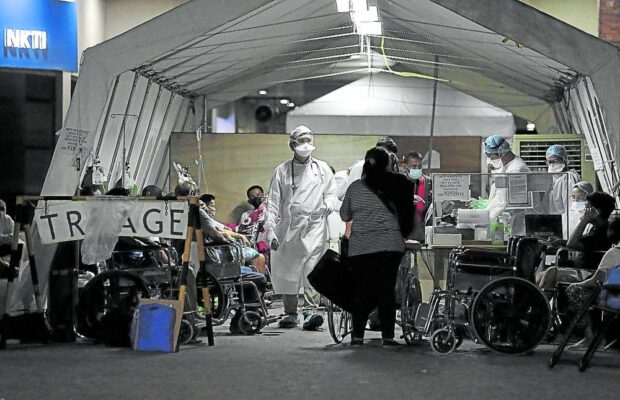Bicam body eyed vs health situation

PANDEMIC PANDORA’S BOX National Kidney and Transplant Institute workers tend to patients at a triage tent during the pandemic, which laid bare the sorry state of the country’s health system. —GRIG C. MONTEGRANDE
Marikina Rep. Stella Luz Quimbo is pushing for the creation of a panel of 10 congressmen and senators who would come up with solutions to address the “dire state” of the country’s health-care system, which she claimed, would likely need an overhaul.
Quimbo on Wednesday filed House Resolution No. 1436, proposing the assembly of a joint congressional commission on health systems to review and assess the Philippine health-care system through a performance evaluation of the offices concerned.
Once convened, the joint panel would be mandated to finish its work in three years—beginning 2024—and would be allocated P300 million: P150 million for its operations; P100 million for the conduct of surveys by the Philippine Statistics Authority; and P50 million for the engagement of foreign and local technical experts to conduct commissioned research, among others.
A total of P100 million of the sought budget would be equally shouldered by the Senate and the House of Representatives for the three years that the joint committee of five senators and five congressmen—led by the chairpersons of the two chambers’ committees on health—would be active.
According to Quimbo, the country’s health-care system was characterized by “poor health outcomes, lack of access to quality care and inefficient allocation of resources” and that the joint congressional committee’s work would “serve as the first step toward a potential overhaul of the system.”
Article continues after this advertisementIn HR No. 1436, Quimbo lamented that despite enacting several laws to reform the Philippine healthcare system, “Inequities and inefficiencies in healthcare delivery and financing continue to persist and result in poor health outcomes.”
Article continues after this advertisement“The Philippines’ performance on Sustainable Development Goal No. 3, which pertains to good health and well-being, has seen only minimal improvement since 2000 and remains grossly insufficient to meet 2030 targets as major challenges continue to thwart progress,” she said.
In emphasizing the sorry state of the Philippine health-care system that urgently needs to be addressed, Quimbo cited the shortage of medical personnel, lack of hospital space and focus on preventive care; the unsuccessful efforts to address HIV cases; and the infant mortality rate, a growth which could be attributed to malnutrition.
She added, “Almost half of [the] patients covered by [the Philippine Health Insurance Corp. (PhilHealth)] pay for their medical expenses out-of-pocket and that any reimbursements by PhilHealth are insufficient to cover hospital expenses.”
‘Contemporary approach’
The lawmaker pointed out that despite a significant surplus in PhilHealth’s resources, members consistently complained of disproportionate reimbursements in hospitalization costs and failure to pay or long delays in payments.
She stressed the need to come up with a more timely approach to the current and quickly evolving healthcare situation where, in addition to expanding access and financing, efforts should also be stepped up in data collection and health information-sharing system, which is crucial to health-care delivery.
“There is a pressing need for an organized and contemporary approach to address the evolving challenges faced by the healthcare sector, particularly in light of the current times,” Quimbo said.